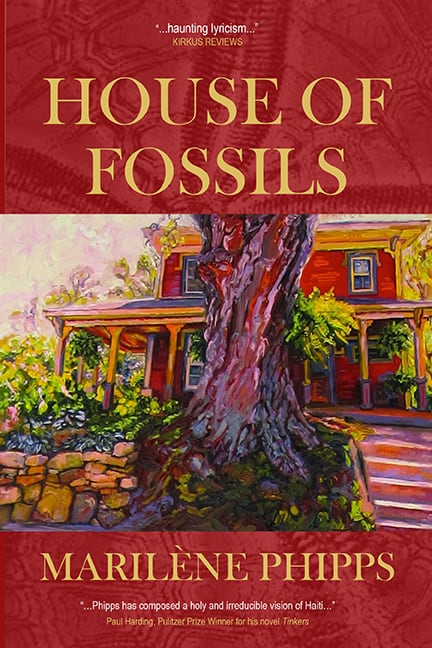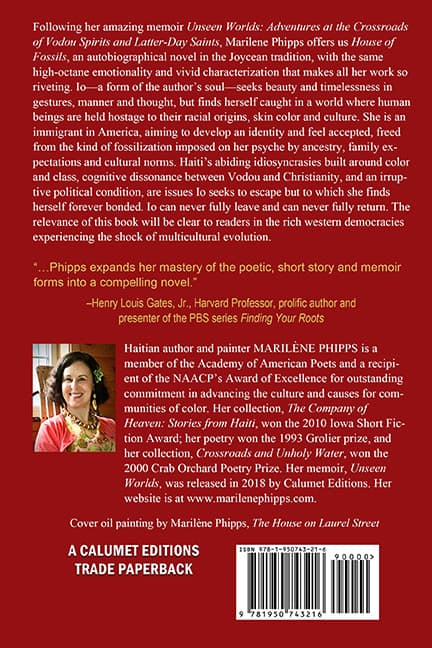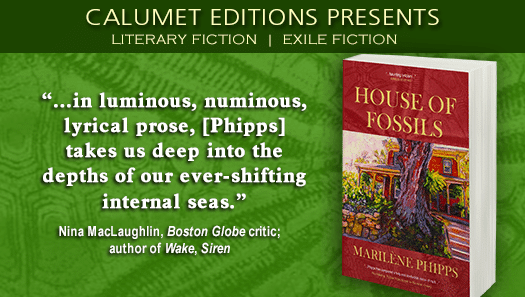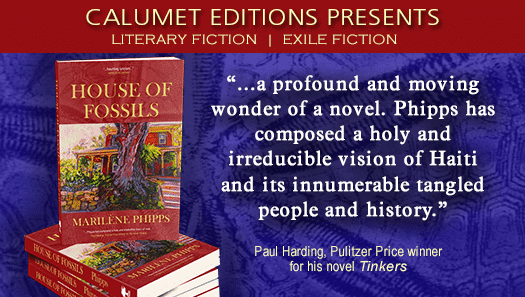New from Marilène Phipps
House of Fossils
Kirkus Review:
“A Haitian American immigrant ponders her life and traumatized homeland in this novel about exile and return.
Phipps tells the story of Io, a mixed-race woman born to an affluent Creole family in Port-au-Prince, as she consolidates her life as an artist and writer in Cambridge, Massachusetts, while still feeling the tug of her past in Haiti. The loose-limbed, episodic narrative unfolds over a decade, starting in 2004 with a dreamy prelude in which Io vacations on the Nova Scotia coast, stays in a strange house full of fossils, and meets a mysterious little girl who is somehow connected to the celebrated ghost ship Mary Celeste. The tale moves on to Io’s legal wrangles with her ex-husband and her estrangement from their adopted Haitian daughter, Eveline; her new marriage to a kind Englishman named Thomas; and a tense Alaskan cruise with her sister, Europa, an eccentric lost soul still living in Haiti who bears emotional scars from brutal relationships with men. A family reunion in Florida reconnects Io with her cagey, charismatic Aunt Rose and other relatives and lets her revisit her socially prominent clan’s history before it was driven out after Rose’s husband was assassinated by Haitian dictator François Duvalier. The book closes with Io’s return to Port-au-Prince, where she takes in the city’s squalor, tensions, and faded glory. She recalls her own narrow escape from a military death squad hired to kill her by a tenant behind on her rent, witnesses a confrontation in which her cousin almost shoots a thief, and goes to the still gorgeous cathedral.
Phipps, a Haitian American poet and novelist, broadens Io’s experiences into a troubled portrait of social fissures. Io lays claim to a legacy of oppression because of the suffering that Haitians endured from European colonialism and slavery. Yet she’s uneasily aware of her own racial privilege, of the seething resentments dividing the light-skinned, Creole elite she belongs to from the poor, black Haitians that her family employs as servants. She feels this antagonism may have poisoned her relationship with Eveline, a black girl born in a slum. The vibrant novel uncoils in rich ruminations and conversations sprinkled with nuggets of history and cultural lore. Sometimes the author’s prose is stark in its depiction of Haitian reality and the hardness it breeds in the poor and rich. (“Beggars swarm around the car, knocking wildly at all windows,” Io observes on the ride in from the Port-au-Prince airport. They “would instantly start slapping and fighting off each other to get the first grab at whatever morsel is handed out, then pummel the one who got it, snatch it from him and run. You’ll lose your arm and anything on it if you try to give alms.”) But Phipps can also shift into a haunting lyricism, as when Io imagines a shipwreck, “feeling the ancient despair of one woman drowned, huddled onto herself, detached like a single musical note etched on a dark green, empty sheet, her disheveled long hair entangled with seaweed that wrapped around her naked white form in long strips resembling the final dress of a mummified being.” The result is an imaginative meditation on Haiti’s beauties and discontents and the mark they leave on a writer’s soul.
An engrossing tale of fractured families trying to cobble their identities back together.”
House of Fossils Endorsements
“This is one of the most moving works of exile literature I have ever read, the poignant account of a deracinated soul… the writer she most resembles is Virginia Woolf. But Phipps differs from Wolf insofar as the memory is both personal and deeply historical.”
– Kenneth Asher, author of Literature, Ethics, and the Emotions
“This novel is transformative… I am transfixed by it… Sheer poetry… Phipps is a major voice in the rich literature of exile, and she opens painful doors for the reader, and for this, I am grateful.”
– Patrick Bellegarde-Smith, author of Haiti: The Breached Citadel
“House of Fossils poetically gathers together a polarity of alluring attractions, of exile and return, of the mysterious sea ebbing and returning.”
– LeGrace Benson, author of Art and Culture of Haiti
“Yes, Marilene Phipps’ House of Fossils is a novel both personal and political refracted through the lens of history and memory and multiple migrations. It is at once haunting and luminous. This is all done with a poet’s fascination with and attention to language and a painter’s exactness with and consideration for color and detail. A truly riveting and compelling read.”
– Jacqueline Bishop, author of The Gymnast and Other Positions
“This is an important book—one that will move you and stir serious discussion with others and, most importantly, with yourself.”
– MJ Fievre, author of A Sky the Color of Chaos
“In this stunning book, Marilène Phipps expands her mastery of the poetic, short-story and memoir forms into a compelling novel. House of Fossils draws a delicate portrait of a woman torn between traditions, geographic locations, and languages while also sketching the disasters, man-made and natural, which mar Haiti’s history. This is a fascinating addition to the literature of immigration.”
– Henry Louis Gates, Jr., Harvard professor, prolific author and presenter of the PBS series Finding Your Roots
“House of Fossils is a profound and moving wonder of a novel. Here is Io, a daughter of Haiti, descendent of that troubled, chaotic nation, held in its orbit, living her satellite existence in Cambridge, Massachusetts. Her imagination is in constant uproar, beholden to the fact that no one gets to choose what she remembers or dreams. Io is a kind of mystic, foreign even to herself, she tells us, a troubled subject of this homeland where it is “as if no one lives a natural life or dies a natural death,” and where she witnesses the tragic elaborations of revenge exacted over and over again, generation after generation. Marilene Phipps has composed a holy and irreducible vision of Haiti and its innumerable tangled histories and peoples.”
– Paul Harding, Pulitzer Prize Winner for his novel Tinkers
“House of Fossils reckons with what it means to be from Haiti, with grace and authority. It is an exhumation – the exhumation of an understanding of self from the dirt of history and experience. It is achieved without bitterness or agenda, unflinchingly, with the tenderness of a confession.”
– Eli MacLaren, author of Dominion and Agency: Copyright and the Structuring of the Canadian Book Trade, 1867–1918
“Marilène Phipps guides us back to the Mysteries, to forces strong and incomprehensible, the experiences that defy language and evade easy meaning. By turns earthy and ethereal, she presents the world we know—its seaweed, its cities, its laws, its longings—and takes us also to the vaster realms, of ghosts and souls, unknowable and infinite. Set in Canada, New England, the author’s native Haiti, House of Fossils explores the place where memory, imagination, and history mingle. Most of all, in luminous, numinous, lyrical prose, she takes us deep into the depths of our ever-shifting internal seas.”
– Nina MacLaughlin, Boston Globe critic; author of Wake, Siren
“House of Fossils expands our understanding, not only of linguistic tensions in the Caribbean but also the historical implications of colonialism in the Americas.”
– Geoffrey Philp, author of Garvey’s Ghost
“Marilene Phipps is our generation’s Joseph Conrad. The voyage through House of Fossils is grounded in dazzling detail, but informed by psychological awareness and spiritual connection. The book is a poetic and masterful portrayal of personal exodus.”
– Susan E. Reed, author and journalist writing for The Times Literary Supplement, The Washington Post, The Boston Globe and The New York Times
“Dreams, ghosts, fossils, memories, race, family, loss, and migration animate this fascinating novel that combines sharp intellectual dialogue with bone-and-blood emotion. Io, the central character, is “fully Caribbean and fully Haitian.” Her struggle becomes ours, and it’s no spoiler to reveal her glorious realization: she can rescue herself.”
– Renee Shea, author of The Language of Composition
“House of Fossils by Marilène Phipps surpasses the usual limits of superb prose. Every sentence evokes the art of storytelling at its absolute best. This is required reading for anyone seeking to commune with humankind on a level that transcends language, country of birth, or even the physical world. House of Fossils pulsates with her inimitable brilliance. It is at once a masterpiece by an award-winning poet, fiction writer, memoirist, and celebrated painter.”
– Katia D. Ulysse, author of Mouths Don’t Speak
“In House of Fossils, Marilène Phipps weaves a soul-stirring narrative around her main character, Io, a daughter of Haiti, going from haunting stories of shipwrecks to revealing encounters and discussions about race and class in Haiti and its diaspora. She leaves no stone unturned in this provocative book about how we connect to others, close and distant.”
– Joëlle Vitiello, Macalester College; writer and scholar on francophone and Haitian literature







